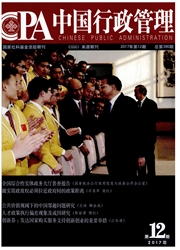

 中文摘要:
中文摘要:
我国地方政府绩效评估出现了模式泛滥的局面,但政府绩效却依然不够理想。通过对42种模式指标体系的“直感强度”、“直感强度离中度”、“真实强度”、“真实强度离中度”的聚中、离中分析,我们发现这些模式的指标体系差别不大,只是在政治领域指标的设置上“模式”特色稍显鲜明,也有部分模式以个别指标的跳跃性赋权来彰显“模式”特色。基于这些发现,我们建议可以从国家制定共通性指标、各地依地方管理特色构造本地绩效评估指标、推行客观绩效数据挖掘以淡化“人为塑造”的痕迹、推进审议绩效评估等方面着手来破解模式“多样”但绩效依然低下的难题。
 英文摘要:
英文摘要:
In China, local government performance evaluations have evolved into a "model colonization" situation, and there are a lot of local governments who claim that they have already developed many new "models" of performance evaluation though they still remain in low efficiency. We probe into 42 "models" of performance evaluation in varied local governments to find that judged by the statistic results of "straight sense strength", "distance between straight sense strength and the mean", "real strength", and "distance between real strength and the mean", the models have no obvious differences in spite of the propa- gandas on how different the models are. On the basis of the findings, we propose to develop common indicators by the state level authorities, prepare special management modes according to local structures, implement performance data mining to weaken "artificial shaping" influences.
 同期刊论文项目
同期刊论文项目
 同项目期刊论文
同项目期刊论文
 期刊信息
期刊信息
